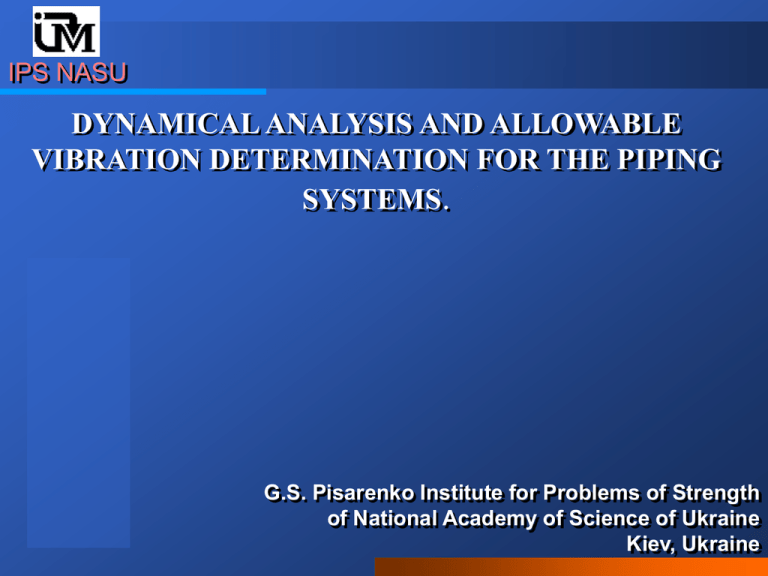dynamical analysis and allowable vibration determination for the
advertisement

IPS NASU DYNAMICAL ANALYSIS AND ALLOWABLE VIBRATION DETERMINATION FOR THE PIPING SYSTEMS. G.S. Pisarenko Institute for Problems of Strength of National Academy of Science of Ukraine Kiev, Ukraine IPS NASU Software complex «3D PipeMaster» Method of calculation of piping at harmonical vibrations Modeling of dynamical behavior of pipe bend as the beam as well as the shell The abilities of the complex for vibrodiagnostics Accident of the oil pipeline «3D PipeMaster» Harmonical analysis IPS NASU Dynamic stiffness method with method of initial parameters y X1 X0 x X 1 A( , dx) X 0 dx y X10 stiffness matrix X11 X20 X21 1 … 2 i 1 X 0 Xn-10 Xn-11 Xn0 Xn1 i X 1 ; n-1 n X 1 A( ) n x 0 X 0 ; A( ) The sweeping procedure n A , dx i i 1 n i 1 «3D PipeMaster» Harmonical analysis IPS NASU Dynamic stiffness method the equations of motion at transversal vibrations d 4W y dx 4 F 2 EI z d z K z dx EI z Wy 0 The inertial term dK z Q y dx dW y dx z - frequency of vibration the equations of the method of initial parameters: W y W y0 Y1 k y x z z Y1 k y x 0 z 0 ky K z0 Y2 k y x EI z k y K z K z0 Y1 k y x Q y0 ky Y2 k y x K z0 EI z k Q y0 2 y EI z k y2 Y3 k y x Q y0 EI z k 3 y Y4 k y x Y3 k y x k yW y0 Y4 k y x Y2 k y x W y0 k y2 EI z Y3 k y x z0 k y EI z Y4 k y x Qy Qy0 Y1 k y x Wy0 k y3 EI z Y2 k y x z0 k y2 EI z Y3 k y x K z0 k y Y4 k y x k y4 F 2 EI z «3D PipeMaster» Harmonical analysis IPS NASU The algorithms for branched and curvelinear elements the conditions in the junctions 2 M 0 Q 0 W 1 W 2 W 3 ... 1 2 3 ... 1 3 m equations for pipe bend X B( ) X ; i 1 0 i i 1 X C() X ; n 1 0 0 n C ( ) Ai , dxni 1 B(ni 1 ) ; i 1 3 2 1 5 4 yb, i1 ye, i cos i ie sin i ; Wy,bi 1 Wye, i cosi Uie sin i ; 3 2 1 4 The matrix of the turning element 1 ib1 ie cos i ye, i sin i ; Wz,bi 1 Wz,ei ; zb, i1 ze, i ; Uib1 Uie cosi Wy,ei sin i . «3D PipeMaster» Harmonical analysis IPS NASU Method of the breaking of displacements for the determination of the natural frequencies and forms Xi-10 i-1 Xi-11 Xi0 Xn1 i i 1 y ,1 W W i y,0 y x Qyi ,11 Q 0 or Qyi ,0 Q 0 the criteria of the determination of the natural frequency Wy ( ) 0 - natural frequency The example of the graph Wy ( ) for T – like frame i 1 y ,1 Wy W W i y,0 IPS NASU «3D PipeMaster» Harmonical analysis Method of the breaking of displacements continuity The role of the estimator is essential !!! The additional frequency can be noticed only at very small step of frequency. «3D PipeMaster» Harmonical analysis IPS NASU Method of the breaking of displacements continuity The examples of finding the natural frequencies and forms for Tlike frame 1 -1 1 1 0.03 -1 =148 с-1 The forms given in the handbooks -1 -1 =212.4 с-1 -1 =214.4 с-1 The additional form of vibration !!! «3D PipeMaster» Harmonical analysis IPS NASU Method of the breaking of displacements modeling of curvilinear element Example: frequencies of the circular ring n=2 n=3 n=4 n=5 Vibration in the plane of circular ring theoretical Our results 167.7051 167.569 474.3416 473.857 909.5086 908.4868 1470.8710 1469.146 Out-of-plane vibration of circular ring теоретическое наши результаты 163.6634 468.5213 902.8939 1463.8510 163.36 467.371 900.391 1459.662 2 EI z n 2 n 2 1 ,n2 FB04 n 2 1 vibrations in plane GI y n2 n2 1 , 4 n2 FB GI 0 n 2 кр 1 EI y Out-of-plane Kang K.J., Bert C.W. and Striz A.G. Е = 2∙106 МПа; G = 8∙105 МПа; Vibration and buckling analysis of circular arches using DQM = 0.3; = 8000 кг/м3; // Computers and Structures. – 1996. –V.60, №1. В0 = 2 м; R = 0.1 м – pp. 49-57. IPS NASU «3D PipeMaster» Harmonical analysis Method of the breaking of displacements modeling of curvilinear element Example: frequencies of the circular arc 1. In-plane vibrations Austin W.J. and Veletsos A.S. Free vibration of arches flexible in shear // J. Engng Mech. ASCE. – 1973. – V.99. – pp. 735-753. 2. Out-of-plane Ojalvo U. Coupled twisting-bending vibrations of incomplete elastic rings // Int. J. mech. Sci. – 1962. – V.4. – pp. 53-72. IPS NASU «3D PipeMaster» Harmonical analysis Advantages 1. The strict analytical solutions are used. 2. The continuity is provided at transition from static to dynamic 3. The infinite number of natural frequencies can be obtained for finite number of elements. 4. The method of sweeping allows to speed up the calculation. 5. Analytical accuracy of modeling of curved element is attained. 6. Any complex spatial multibranched piping system can be treated. 7. The vibration direction (modes) of interest can be separated 8. The influence of the subjective factors are excluded (the breaking out on the elements) Dynamical model of pipe bend as the beam as well as the shell IPS NASU The curved beam element is strict but pipe bend have the increased flexibility! A B A B R - parameter of curvature B R2 - flexibility parameter Bt O C Kz D Kz D C R d1 d 0 B Physical equation is corrected d K M dx EI Equation of the transversal vibration with accounting of increased flexibility: 2 for straight pipe 1 d 4W d F K W 0, K д 4 dx EI K f , , , P, x for pipe bend Depends from the frequency ! Determination of the flexibility of the pipe bend IPS NASU Equation for bend as a shell v O 1 O u r w N 1 Q Qx N x sin 2w h 2 0 R R x B0 t y t B 1 N Q L N x cos 2v h 2 0 R R x B0 t x R z Physical equations N H N x H H L 1 2 Equilibrium equations: M H M x H M x H 1 2 L N x Qx sin 2u h 2 0 x B0 t 1 M M x Q 0 R x Qx 1 M x M x 0 R x IPS NASU Geometrical equations: deformations u v cos w sin x 1 v w R R B0 curvatures 1 2w w 2 2 2 R R Determination of the flexibility of the pipe bend 2 v 2 2 w R x R x 2w 2 x 2w 2 x The simplifications: semimomentless Vlasov’s theory: 0,..., 0 u v v R ,..., w x 2 R R geomtrical characteristics: 6, 0 B Bt 2 2 v v restrictions on the wave length in the axial direction x 2 2 4 2 1 Q Q R 4 2 3 2 2 2 N x cos sin N x 2v 4v N x R h 2 2 4 0 2 2 x B0 B0 t Determination of the flexibility of the pipe bend IPS NASU Solution for the cylindrical shell n n 1 h E B , vx, , t V x sin n sin t , R n 1 n 121 R 4 0 IV n V 2 n 2 2 2 2 n4 n2 1 h2 n n 1 V 0 2 6 n ER 2 12 1 R 2 m частота, Гц experiment FEA [Salley and Pan] our results 1000 800 600 1,1 1,2 мода колебаний (m, n) 2 , 2 2 Salley L. and Pan J. A study of the modal characteristics of curved pipes // Applied Acoustics. – 2002. – V.63. – pp. 189-202. 1400 0,2 2 2 R A S 1600 1200 2 m 2 2 2,2 3,2 Determination of the flexibility of the pipe bend Решение для гиба IPS NASU The sought for solution : vx, , t RV2 x, sin 2 V3 x, cos 3 ...sin t , K x, 1 д 3 2k x V 2 x, B0 ER The resulting equations: a1,nVn a2,nVn2 a3,nVn2 a4,nVn1 a5,nVn1 aVnIV f n a1,n a1,n n 2 n 2 1 B, 2 2 a1,n a1,n n n 1 B, a1,n 144 12 A, R a4 , n a4 , n 1 R ; h 3 2 n 1 n n n a4,n 12 1 ; n 1 2 R 4 (1 2 ) A (1 2 )2 ; 2 2 B0 h R2 4 a 12 1 R ; h2 2 2 a1,n n 4 n 2 1 6 A n 2 n 2 1 , a2,n 3 A n 2 3 n1 n; 2 n2 n3 a3,n 3 A n 2 3 n1 n; R ; h 3 2 n n n n 12 1 ; n 1 a5,n a5,n 1 2 R 2 a5,n f 2 72 Ak x , n 2; n 3; f n 0, 12(1 2 ) R 4 2 B h2 E Determination of the flexibility of the pipe bend IPS NASU Assume: V if IV n FK д ( , 2 ) 2 EI z 28.8 3 A B B 1 K д 45 Vn 30 25 20 then we obtain : A=1 A=3 A=6 A=10 A=15 A=30 15 a1,n a1,n n 2 n 2 1 B, n2 a1,n 144 12 A, a1,n a1,n , 2 4 2 2 2 a1,n n n 1 6 A n n 1 , n 3 Kд 10 5 0 10 20 A (1 ) 2 Results: 2 - The coefficient of flexibility at harmonical vibrations K 72 6 A 11B B 0 72 6 A 11B 2 4B72 60 A 10B 2B 30 40 50 12(1 2 ) R 4 2 B h2 E 60 R2 Bh Determination of the flexibility of the pipe bend IPS NASU L. Salley and J. Pan. A study of the modal characteristics of curved pipes // Applied Acoustics. – 2002. – V.63. – pp. 189-202. experiment 3000 FEA [Salley and Pan] 2600 B our results with dynamical К K=1 l l 2200 the Saint-Venant (static) solution частота, Гц h R 1800 1400 Е = 2.07∙106 МПа; = 0.3; = 8000 кг/м3; R = 0.0806 м; h = 0.00711 м; В = 0.457 м l=0.2 м 1000 600 200 R,2s R,2a 1,2s 1,2a 3,2s мода колебаний (m, n) 3,2a 1,1a Abilities of «3D PipeMaster» for vibrodiagnostics IPS NASU W W0 1 P A Pt P0 cos t P0 1 Е = 2∙106 МПа; G = 8∙105 МПа; = 0.3; = 8000 кг/м3; l = 5 м; R = 0.1 м; h = 0.005 м. х B 1 l 1. The graph of bending moment in the central point of supported-supported beam 1 4 F 2 l 4 2 EI l Pl M 0 tg th 2 8 136 rad s 3 2 частота, рад/c -3 -4 4.E+07 3.E+07 1.E+07 0 -2 P0, H 2.E+07 1 -1 6.E+07 5.E+07 M(l /2) 4 2. Restoration of the outer force from the known displacements in arbitrary point 0 50 100 1.25 150 200 250 300 0.E+00 -1.E+07 0 -2.E+07 -3.E+07 -4.E+07 500 1000 1500 частота, рад/c IPS NASU Abilities of «3D PipeMaster» for vibrodiagnostics The problems of vibrodiagnostics 1. The points of application of the outer forces, their directions and frequencies are unknown. 2. The gauges can measure the displacements of pipe points, their velocities and accelerations 3. The number of gauges is finite. The functions of the calculation software 1. The correct determination of the dynamical characteristics. 2. Correct modeling of the piping behavior when the correct measurement data are provided. 3. The best possible assessment of the behavior with restricted input data. 4. The best possible assessment of the dynamical stresses based on the incomplete measurements Abilities of «3D PipeMaster» for vibrodiagnostics IPS NASU Fy ,Wy х A B M ,W , Q y M ,W , Q y l 20l Fy t F0 sin t Е = 2.0689∙106 МПа; μ= 0.3; = 7836.6 кг/м3; l = 6.096 м; Δl=0.3048м; R = 0.05715 м; t = 0.0188 м. 1 11.66 Гц, 2 37.65 Гц, 3 78.18 Гц. The frequency of outer force is given but the point of its application is unknown. The gauges measure the displacements 1. Input data are the results of excitation of beam by harmonical force applied at its center. The calculated values of transverse forces, bending moment, displacements in 21 points are recorded. This is so called «real case». 2. The system (beam) is loaded by «the real» displacements in a few (or one) points, the moments and displacements are calculated. 3. The calculated in 2 results are compared with «real data». Abilities of «3D PipeMaster» for vibrodiagnostics IPS NASU х A 2 points of measurements B 3l 3l 0.003 2500 0.0001 2000 0.0025 0 0 1500 2 4 6 8 10 12 14 16 18 20 400 -0.0001 1000 0.002 -0.0002 500 0.001 0 -500 -0.0004 -1000 -0.0005 -1500 0.0005 -0.0003 W 0 200 -200 -0.0006 -400 -2000 0 -2500 0 5 10 15 20 25 -0.0007 -0.0008 -600 Длина, deltaL W восст. W "реал." =8 Гц M восст. Длина, deltaL M "реал." W восст. W "реал." M восст. =21 Гц M "реал." M 0.0015 M W 600 Abilities of «3D PipeMaster» for vibrodiagnostics IPS NASU 0.0001 600 400 0.00005 200 0 W 2 4 6 8 10 12 14 16 18 20 0 M 0 -0.00005 -200 -0.0001 -400 -0.00015 -600 =60 Гц Длина, deltaL W восст. W "реал." M восст. M "реал." 0.0008 4000 0.0005 4000 0.0006 3000 0.0004 3000 0.0004 2000 0.0002 0.0003 2000 0.0002 1000 1000 2 4 6 8 10 12 14 16 18 0 W 0 0 0 20 0 -0.0002 -1000 -0.0004 -2000 -0.0006 -3000 -0.0003 -4000 -0.0004 -0.0008 2 4 W "реал." =80 Гц M восст. 8 10 12 14 16 18 -3000 -4000 Длина, deltaL M "реал." 20 -1000 -2000 -0.0002 Длина,deltaL W восст. 6 -0.0001 W восст. W "реал." M восст. =100 Гц M "реал." M 0 M W 0.0001 Abilities of «3D PipeMaster» for vibrodiagnostics IPS NASU 2 points of measurements х A B l l 0.00002 0 0 2 4 6 8 10 12 14 16 18 600 0.00006 600 20 400 0.00004 400 200 0.00002 200 0 0 0 0 -0.00008 2 4 6 8 10 12 14 16 18 20 -200 -0.00002 -200 -400 -0.00004 -400 -600 -0.00006 -0.0001 -0.00012 -0.00014 -600 Длина, deltaL Длина, deltaL W восст. W "реал." M восст. =60 Гц M "реал." W восст. W "реал." M восст. =140 Гц M "реал." M -0.00006 M W -0.00004 W -0.00002 Abilities of «3D PipeMaster» for vibrodiagnostics IPS NASU 4 points of measurements х A B 2l 3l 3l 2l 0.00002 600 0 0 5 10 15 20 400 -0.00002 200 -0.00008 -200 -0.0001 -400 -0.00012 -0.00014 -600 400 0.00004 300 0.00002 200 -0.00002 100 0 2 4 W "реал." M восст. =60 Гц 8 10 12 14 16 18 0 -100 -0.00006 -200 -0.00008 -300 -0.0001 -400 -0.00012 -500 -0.00014 -600 Длина, deltaL M "реал." 20 -0.00004 Длина, deltaL W восст. 6 W 0 0.00006 M -0.00006 500 0 M W -0.00004 0.00008 W восст. W "реал." M восст. =100 Гц M "реал." IPS NASU Abilities of «3D PipeMaster» for vibrodiagnostics All measurements in all points are used Complete coincidence Conclusions from modeling: 1. To evaluate stresses the most importance have the proximity of the points of measurements to the point of the force application. 2. The accuracy grows with the number of the points of measurement 3. The accuracy nonmonotically decrease with the frequency of the excitation IPS NASU Abilities of «3D PipeMaster» for vibrodiagnostics Determination of the maximal stresses based on the measurements of velocities For simply supported beam: M d 2W 2 2 R, M 2 EI MAX A 2 k ER I dx L mk2 4 (k ) EI x Wt A sin k * k L MAX 2 E For a thin walled pipe: Wt MAX for a solid circular beam: MAX 4 E Wt MAX For the real complex piping systems: MAX m ER IE Wt MAX FR 2 E I dynamic susceptibility coefficient MAX C form 2 E , Wt MAX C form 1 IPS NASU Abilities of «3D PipeMaster» for vibrodiagnostics Examples of the piping configuration IPS NASU Abilities of «3D PipeMaster» for vibrodiagnostics Determination of the maximal stresses based on the measurements of velocities Е = 2.06843∙106 МПа; = 7834 кг/м3; l = 18 м; R = 0.1 м; t = 0.01 м. Theoretical value: MAX Pа s 5.98 *107 Wt MAX m J. C. Wachel, Scott J. Morton, Kenneth E. Atkins. Piping vibration analysis IPS NASU Abilities of «3D PipeMaster» for vibrodiagnostics Determination of the maximal stresses based on the measurements of velocities For parameters Theoretical value 1 11.66 hertz ω, Гц MAX Wt MAX obtained value Е = 2.0689∙106 МПа; ρ=7836.6 кг/м3; R = 0.05715 м; t = 0.0188 m MAX Pа s 5.69 *107 Wt MAX m The results of calculation: 2 8 21 40 60 80 3.08E+08 7.78E+07 2.87E+07 5.71E+07 5.12E+07 5.55E+07 5.4 1.4 0.51 1 0.9 0.98 When the exciting frequency exceeds the first natural frequency the correlation between the vibrovelocity and maximal stresses is good IPS NASU Conclusion 1. Due to application of dynamical stiffness method the continuity between the static and dynamic solution is provided. 2. The procedure of the breaking of the displacements in any point and in any direction allow to find all natural frequencies and forms 3. In a first time in a literature the notion of dynamic coefficient of pipe bend flexibility is introduced and analytical expression for it is obtained. This allowed to perform calculation for the piping systems with a higher accuracy 4. The option of determination of exciting force in some point based on given displacement or velocity in any other point of the piping allows to efficiently perform the vibrodiagnostic analysis









